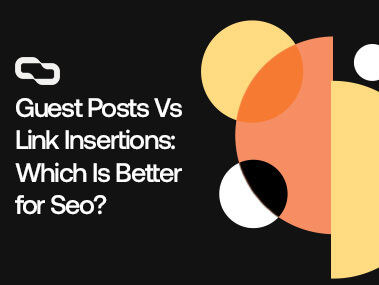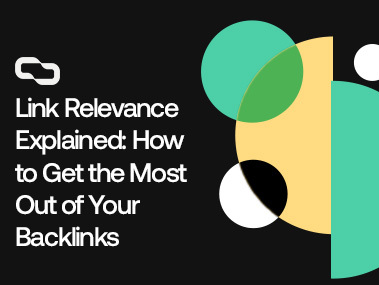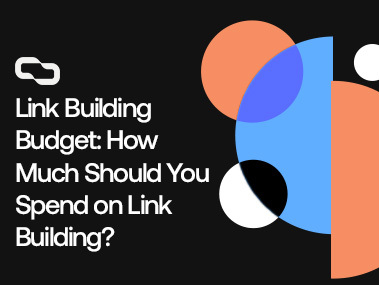25 Link-Building Mistakes to Avoid in 2024
I've been building links professionally for over 5 years now.
And in this article, I'll share with you the 25 most common link-building mistakes that I've learned over the years.
So without further ado, let's jump right into the first link-building mistake.
Key Takeaways
- Focus on acquiring fewer, but higher quality and more authoritative backlinks, rather than a large quantity of low-quality ones.
- Broaden your concept of valuable backlinks beyond just relevance; give weight to the trust and authority they bring, while also ensuring a natural and diversified backlink profile.
- Supplement your backlink strategies with a solid on-page SEO foundation, an internal linking structure, and active monitoring of your backlinks to maintain integrity and SEO effectiveness.
1. Prioritizing Quantity Over Quality

If your website were hanging out in a crowd, you'd want it to be with the cool, trustworthy folks, right?
Not the shady characters you cross the street to avoid.
That's pretty much how link-building works.
It's not about how many friends (or links) you can show off; it's about the quality of those friendships.
Let's get real for a second. Spamming the web with tons of low-effort links is like trying to build a castle on sand.
Sure, it might look impressive from a distance, but it won't hold up when things get tough (like when Google updates its algorithms).
Best case? Those weak links do nothing for you. Worst case? They drag you down into penalty territory.
So, what should you do? Aim for natural links from websites that are big deals in their own right.
These are the relevant websites that Google looks up to. When they link to you, it's a big thumbs up to your credibility.
And please, oh please, stay away from those shady deals on Fiverr or other places selling cheap backlinks by the dozen.
They're often just link farms—think of them as the online equivalent of a dodgy market stall selling knock-off watches.
They might look the part to an untrained eye, but they offer zero value and could get you in trouble.
Also, keep an eye out for low-quality sites that are a bit too generous with their links.
If a site is linking out to everyone and their dog, including sketchy niches like gambling or adult content, steer clear. You don't want to be lumped in with that crowd.
2. Overvaluing link relevance

Link relevance. Yes, it matters, but it's just part of what you need to think about.
Search engines use backlinks, among other things, to figure out what your website's all about.
Say your site gets a bunch of links from car-related websites; Google will catch on and think, "Ah, this site must be in the car game."
But here's the twist: once search engines have a handle on your site's theme, the importance of having super-relevant links starts to fade.
What really starts to matter is the power and authority of your links. Think of it as moving from making a good first impression to building a solid reputation.
So, what's the takeaway?
Don't obsess over getting links from sites that are exactly in your niche.
It's good at the start, but after a while, you should focus on getting high-quality links from all sorts of reputable sites.
That's what'll really kick your search engine ranking into high gear.
Beware of piling up too many links from irrelevant sites, though.
It's all about balance.
Aim for a mix that shows search engines your site is both relevant and respected.
3. Being too Critical of Third-Party Metrics
Metrics like Domain Rating (DR), Domain Authority (DA), and Trust Flow (TF) are supposed to tell you how awesome a website is.
But they're not always what they're cracked up to be.
Seriously, you can go on Fiverr right now and find loads of people promising to boost your site's DR to 70 for less than 100 bucks.
And guess what? They can actually do it.
These metrics are more like a quick glance in the mirror rather than a full health checkup.
They can be messed with pretty easily, making them a shaky foundation to base your whole organic link-building strategy on.
So, what should you do instead?
Focus on stuff that's tougher to fake.
I'm talking about organic traffic and how many keywords a site is ranking for.
These are the real deal because they show how a site is performing in the wild, not just on paper.
4. Anchor Overoptimization
Anchor text (the clickable words in a hyperlink) can make or break your site's relationship with Google.
Google's pretty smart about spotting when you're trying to game the system, especially with anchor text.
Using exact match anchor text (that's when the clickable text is exactly the same as or very closely matches the keywords you're trying to rank for) sounds like a winning strategy, right?
But if you go overboard and use too much exact match anchor text, Google's going to notice. And not in a good way.
It's like waving a giant red flag saying, "Hey, look at me trying to manipulate rankings!" This can lead to penalties, and trust me, you don't want that.
So, how much is too much?
Unfortunately, there's no magic number.
But, it's important to remember that anchor text optimization is looked at on a page-by-page basis, not for your site as a whole.
This means you can't offset over-optimized anchor text on one page by being more conservative on another. Each page stands alone in Google's eyes.
Now, you might be wondering, "How do I get it right, then?"
Here's a pro tip: look at what's working. Check out the top 3 to 5 pages that rank for the keywords you're targeting.
Take a close look at the anchor texts they're using. This gives you a benchmark.
The goal isn't to copy them exactly but to get a sense of the variety and distribution of anchor texts that are working well in the eyes of search engines.
5. Forgetting About The Blacksheep Effect
In the game of link building, the goal is to fly under the radar.
It's a bit like trying to win a game without letting the referee know you're playing by your own set of rules.
The key here is looking as natural as possible to Google.
So, here's where things get tricky.
Imagine everyone else is walking around with an average of 5 links to their name.
If you decide to show up with 20, you're not blending in—you're sticking out like a sore thumb.
This is what we call the Blacksheep Effect.
You don't want to be that one black sheep in a flock of white ones, drawing unwanted attention from Google.
6. Over or Underbuilding Links

Hitting the right number of links for your site? It's tricky.
Some site owners throw their entire SEO budget at building or buying links, but that's a rookie move.
Why? Because not all agencies play fair.
They'll promise the world, spend your cash, and deliver zilch.
Real SEO experts crunch the numbers first.
They'll tell you straight: "You're overspending. Just use half for those keywords. Invest the rest in social media marketing, high-quality content, or PPC for the tough keywords."
Or they might just be upfront: "$500 a month won't get you anywhere with 'solar panels'. You need a bigger boat for that."
The bottom line? Smart spending beats just spending.
We have a step-by-step guide on how to calculate your link-building budget, so make sure to check it out.
7. Ignoring Link Velocity
If a new website suddenly gets bombarded with a ton of backlinks, it raises red flags for Google.
It just doesn't make sense for a site that barely anyone knows about to suddenly get loads of attention.
There's no traffic backing it up, no buzz on social media, and no real chatter about the brand elsewhere.
It looks fishy because it is. Google's smart enough to see this for what it is – an attempt to manipulate your way to the top.
And just like that, your site could be pushed to the sidelines, not making any significant ranking progress for a long, long time.
In this guide, you can learn more about the optimal link-building velocity for your site.
8. Ignoring Your Homepage
Think of your website as a tree. Your homepage is the trunk, the main part that holds everything else up.
It's crucial because it's usually the first place visitors land.
It should get the most links pointing to it, kind of like how a strong trunk supports a tree.
These links act like votes of confidence from other websites, telling search engines, "Hey, this site is trustworthy and valuable!"
This boosts your site's reputation and helps with something called E-E-A-T, which stands for expertise, authoritativeness, trustworthiness, and experience.
Basically, it makes your website look good in the eyes of Google and other search engines.
But here's the kicker: while loading up your homepage with backlinks is a solid move, stopping there is like only exercising one arm and ignoring the rest of your body.
Sure, your homepage will look buff, but what about the other pages?
You need to spread the love to other pages, too — your service pages, your amazing guides, the places on your site where people can actually see what you're all about.
A good rule of thumb? Try to split where your links go.
Aim for a 50/50 split between your homepage and other key pages.
9. Forgetting about Tier 2 links
Most of the time, the pages linking to you are new, with little to no backlinks of their own.
This means they don't carry much "link juice" — that's the value passed through links that helps improve your rankings.
Without enough juice, your Tier 1 links (links that point directly to your site) might not be as powerful as you need them to be to make a real difference in your website's ranking.
That's the missing link in many link-building strategies.
By adding Tier 2 links (links to your Tier 2 links) into the mix, you're essentially powering up those initial links.
This way, you're not just relying on the domain's overall authority but actively enhancing the strength of your backlinks.
This approach helps bridge the gap in domain authority and ensures your website doesn't fall behind in the search engine rankings.
For more information, check our tiered link-building guide.
10. Excessive Reciprocal
Reciprocal linking — when two websites agree to link to each other — can be a good move if done sparingly.
However, too much of it, especially with irrelevant websites, might catch Google's attention for the wrong reasons.
Google sees excessive reciprocal linking as a sign that you're trying to game the system, a practice it frowns upon. This could lead to your website being penalized.
In essence, exchanging links should not be the main strategy you rely on to build your website's authority.
A couple of well-thought-out link exchanges with relevant, high-quality websites can help, but overdoing it is a no-go.
11. Building links from no-index pages or domains
When you build links, it's crucial to make sure they're visible to search engines like Google.
If a page or an entire website isn't indexed, Google can't see or count any backlinks from there.
It's as if they don't exist. This means all your effort in building those links won't help your site's SEO at all.
Also, if you come across a website that isn't indexed, take it as a warning sign.
Google probably views it as low quality. Linking your site to such sites can make your site look bad too.
12. Building Links via content Syndication services
Content syndication services used to be a big deal for getting more links to your website. But times have changed.
Google's gotten smart about spotting when content's just copied and pasted all over the web, especially if it's ending up on low-quality news sites.
This kind of move can actually backfire, hurting your search rankings instead of helping.
Don't rely on content syndication for building links.
It's okay to use it to spread your message wider and reach more people, but for boosting your site's standing in search results?
Not so much.
13. Getting site-wide links
Imagine if someone shouted your name in every conversation they had, regardless of the context.
It wouldn't take long for people to start questioning why.
That's how search engines view sitewide links.
These links stick out as unnatural and can make your link-building efforts look sketchy.
14. Building Cheap PBNs to Money Sites
Using cheap Private Blog Networks (PBNs) to link directly to your main site is risky business in SEO.
Sure, PBNs pack a punch with their link juice, boosting your site's rankings because they come from the homepage.
But, it's a gray area - kinda like playing with fire because it's seen as a no-go by search engines.
Instead of directly linking to your main site, it's smarter to use PBNs for what we call Tier 2 or Tier 3 links.
This means you're building links to pages that then link to your site.
It's like having a buffer. This way, if there's any trouble, your main site stays safe, as penalties don't transfer beyond tier 1s.
15. Failing to Disavow Harmful Links

Failing to disavow harmful links is one of those link-building mistakes to avoid.
Google might tell you they're good at spotting and ignoring bad links, but it's better not to take their word for it.
Sure, they try to discount those low-quality or irrelevant links, but remember, Google's got its own costs to consider.
By disavowing harmful links yourself, you're basically doing Google a favor, and they might just reward you for it. Plus, there are plenty of stories out there about websites climbing higher in search engine rankings after they've cleaned up their link profile.
So, don't get caught up in a weird link network or stick with irrelevant links.
Be smart, take control, and clean up your backlinks. It's worth the effort.
16. Shying Away from 'NoFollow' Links
Think NoFollow links are a waste of time because they don't pass PageRank? Think again.
Even giants like Forbes slap a NoFollow tag on all their external links.
Does that make a link from Forbes useless? Absolutely not.
NoFollow links still matter for many reasons.
First, if every single link pointing to your site is a dofollow link, it's going to raise some eyebrows.
It's like having all the answers in a test — it looks fishy.
Second, nofollow backlinks can still signal to search engines about the trust and authority of your site (that's the EEAT part.)
Additionally, they can boost your brand's visibility and drive traffic directly to your site.
NoFollow links happen all the time on the web. They're simply part of the landscape.
So, having a mix of NoFollow and DoFollow links makes your site's link profile seem more legit.
Learn more about all the link attributes in our types of backlinks guide.
17. Getting Links from Poor Content
A link is only as credible as the content it springs from.
Links embedded within poor or plagiarized content can be a stain on your site’s reputation, signaling to search engines and visitors alike that your site might be associated with low-quality sources or even paid links.
This association can diminish the perceived trustworthiness and authority of your site, leading to adverse effects on your search engine rankings.
18. Building Links in a negative context
It's a common industry belief that Google and other search engines can actually look at what's being said around your link.
If trustworthy sites are associating your site with negativity, it’s reasonable to expect some backlash from the search engines.
The extent of this impact is not fully understood, but it’s a risk not worth taking.
19. Ignoring On-Page SEO
Google looks at three main things to decide if your website is worth showing to people.
First, content quality. This means stuff like using the right keywords, having a good structure to your headings, making sure your content actually helps people, and linking to other relevant pages on your site.
Second, user experience. This includes how fast your page loads, how it looks, and how easy it is to use.
Third, backlinks. These are links from other websites to yours. They're important, but they're also the priciest part of SEO.
So, the message is clear: before you dive into link building, make sure you've got your on-page SEO sorted.
This means your content needs to be top-notch and your website should be easy and pleasant to use.
Once you've got those covered, then go ahead and work on getting those valuable backlinks.
This way, when people land on your site, they'll have a good reason to stick around.
20. Using Automated Link Building Tools
It's tempting to try and save time with automated link-building tools.
However, this approach often does more harm than good. Here's why you should think twice before using them:
- They're Seen as Spam: Both search engines and real people can spot these automated links a mile away. When your site gets lumped in with spam, it's not just about losing clicks; your entire online reputation can take a hit.
- Low-Quality Links: The links these tools generate usually come from sites that won't do you any favors. Instead of boosting your site in search rankings, these low-quality backlinks can drag you down, making it harder for the right users to find you.
- The Exception - Tier 3 Backlinks: There's one situation where automated tools might not be totally off the table, and that's for something tier 3 backlinks. But even then, it's rarely worth it.
21. Not diversifying link-building strategies
When it comes to link building, putting all your eggs in one basket isn't the best idea.
Search engines can tell when your link building isn't diverse— which looks like you're trying to manipulate search rankings.
To keep things looking natural and improve your site's standing with search engines, mix it up!
Here are some straightforward strategies you can use:
- Create and share infographics.
- Use HARO (Help A Reporter Out).
- Look for broken links on other sites.
- Resource pages link building.
- Keep up with guest blogging.
- Promote your content on social media.
By using a variety of methods, your link building will look more natural to search engines, helping your site rank better and attract more visitors.
22. Not Building Geo-Targeted Links for Local & International SEO
Skipping geo-targeted link building means missing out on boosting your local SEO.
These links are like local endorsements, showing search engines your relevance in your area.
Without listings in local directories and connections with nearby businesses, your site won't rank as well in local searches.
It's a simple but crucial step for getting noticed by customers in your community.
For more information, check our guide on how to build local backlinks.
23. Not Having a Solid Internal Linking Structure

Internal linking is a simple yet powerful tool for boosting your website's SEO, and it's surprising how often it's overlooked.
Think of it as a way to connect the dots between your content, making it easier for Google to figure out what you're all about.
This isn't just about helping search engines; it's also about making your site more user-friendly.
When your pages are well-connected, visitors can easily find more of your content, keeping them engaged longer.
Neglecting internal linking means you're missing out on a great opportunity.
It's free to implement and can significantly impact your site's performance in search rankings.
By linking your pages smartly, you're spreading the "link juice" around your site, which can boost your visibility on search engines.
Plus, it helps establish your site as an authority on specific topics by clearly showing how your content relates to itself.
24. Not Using Social Signals
Ignoring social signals is like leaving money on the table.
Think about it this way: when your content gets a lot of likes, shares, and comments on social media, it's not just about looking popular.
It's a beacon for bloggers, journalists, and influencers who might link back to your site.
Some folks argue about how much social media directly helps your rankings.
But here's the deal: when your content is buzzing on social media, it shows Google that people find it valuable and relevant.
So, even if the direct impact isn't clear, the indirect benefits are undeniable.
25. Not Monitoring Your Backlinks
By checking your backlinks regularly, you get a clear picture of what's actually helping your site and what's not.
This way, you can double down on the good stuff and ditch the strategies that aren't paying off.
Also, websites change all the time. Pages get deleted, updated, or moved, which means you might end up with broken links.
If you're not monitoring, you won't even know when a valuable backlink disappears.
Finally, watch for brand mentions without links — these are missed chances for new backlinks.
FAQs
Is it still valuable to get 'NoFollow' links?
Yes, 'NoFollow' links are still valuable as they contribute to a natural backlink profile, provide EEAT signals, improve brand recognition, and bring in referral traffic.
How often should I monitor my backlink profile?
You should monitor your backlink profile at least once a month to ensure its quality and to address any low-quality or spammy links. Regular monitoring helps in identifying and fixing broken links.
Can I use automated link-building tools for my main website?
No, it's best to avoid using automated link-building tools for your main website as they can negatively impact your SEO by generating unnatural and low-quality links.
Should I focus on building links to my homepage or deep pages?
Focus on building links to both your homepage and deep pages. While the homepage should receive a higher concentration of links, directing traffic to specific areas of your site and improving conversions can be achieved by building backlinks to deep pages as well.
How can I avoid the Blacksheep Effect in link building?
Avoid the Blacksheep Effect in link building by gradually building backlinks in a natural and proportional manner, and using Tier 2 links to strengthen existing ones. This helps prevent negative attention and ensures a more organic growth of popularity.
Conclusion
Link building is all about building as many powerful backlinks while looking natural.
By avoiding these link-building mistakes, you ensure that you have a natural backlink profile and significantly reduce the risk of penalties.
If you need help with your link building, make sure to reach out.
We offer SEO consultation calls for all business owners, free of charge.
Find out your exact cost of ranking for your dream keyword
Let’s get you ranking now
If you want the team at Get Me Links to help you get more traffic



